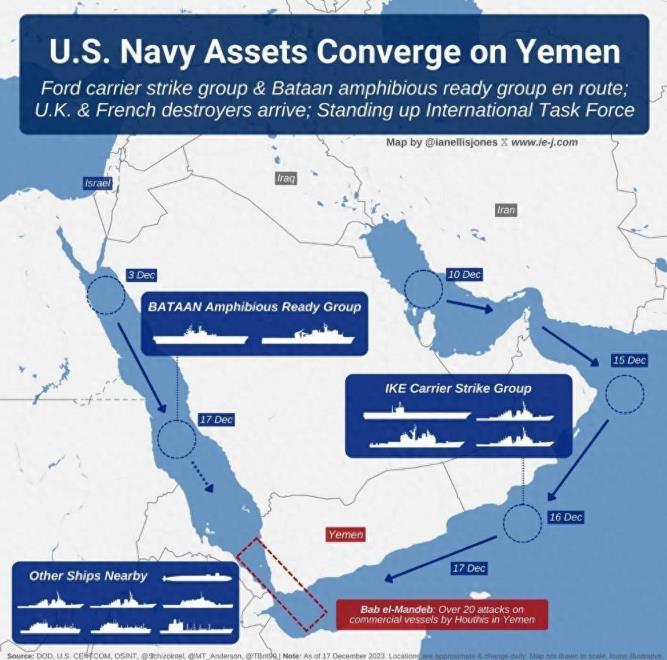U.S. Military Builds up in the Red Sea as Houthi Rebels Remain Defiant, Threaten Missile Strikes on U.S. Warships
The spillover effect of the Israeli-Palestinian conflict has escalated tensions in the Red Sea. Yemen’s Houthi rebels, aiming to pressure Israel into a formal ceasefire and allow more humanitarian aid into Gaza, have been attacking and detaining ships linked to Israel in the Red Sea since November. Given Israel’s reliance on import-export trade and its limited naval presence in the Red Sea, the nation has struggled to respond effectively.

As Israel’s strongest ally, the United States has taken up the task of escorting Israeli ships through the Red Sea. With increasing frequency and magnitude of Houthi attacks, the U.S. has rallied several Western countries for a multinational escort mission to counter the Houthi threat and protect Israeli ships.
Currently, approximately 13 U.S. warships, including the recently arrived “Eisenhower” aircraft carrier strike group, have been deployed in the Red Sea. This move is seen as a direct U.S. support to Israel, aimed at helping Israel focus on resolving the conflict in Gaza without concerns over maritime security.
However, the Houthi rebels are not easily intimidated. Following the U.S. announcement of the “Red Sea Escort” alliance, Houthi leaders warned that if the U.S. targets their forces, U.S. warships in the Red Sea would also become Houthi targets. The rebels’ stance is clear: they are targeting Israeli ships, and any U.S. intervention will result in their missiles and drones targeting U.S. vessels.
The Houthis, armed with various Iranian missiles and controlling most of Yemen’s territory, have proven to be a formidable force. The U.S. is cautious about engaging directly, lacking full confidence in a quick resolution. Lessons from the prolonged conflicts in Afghanistan and Vietnam weigh heavily, indicating potential difficulties in a direct confrontation with the Houthis.
In summary, while the U.S. aims to protect Israeli interests and maintain maritime security in the Red Sea, any direct military action against the Houthis could lead to a significant escalation, making the situation in the Middle East more volatile. Hence, the U.S. is likely to focus on defense and interception in the Red Sea, avoiding actions that could lead to uncontrollable consequences.